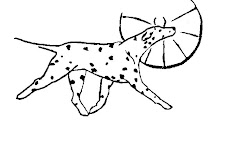

A couple of my favorite pictures of Carina - whose puppy temperament test 7 years ago was "It's all about me". Work, training, socialization, and persistence paid off!
Yesterday we had our very good friend Marie Gagnon come over and temperament test the puppies. Marie has been doing this on all our litters for many years. Because we spend so much time ever day with the puppies we have a pretty good idea of their temperaments, but it is very helpful to have a set of “fresh” eyes evaluate the litter.
Marie makes sure the puppies are in a new place and she is a new person. Seven years ago Marie tested Carina, the puppies’ grandmother, as having great obedience potential, if convinced she had to. Carina tested independent – that the world was all about her. To this day that is Carina. And my whole training has been about working with her individual personality and developing her working for ME! One of the puppies tested the same way – we’ll see if Amy is up to the challenge!
The puppies tested pretty much as expected. This test give us, and the new owners, an idea of the puppy’s individual personality and what areas could use work to develop them to their full potential. While not perfect, it does help us gain insights into a puppy's character.
One VERY important factor to keep in mind is that the puppy's behavior as an adult will depend on many factors, including his life experiences and the socialization and training he receives from his owners. Exposure, socialization and training can not be overemphasized. The best natured puppy will develop severe issues if kept home and never exposed to the rest of the world. And a shy puppy can blossom into a social butterfly with positive experiences and socialization. Adult dogs with temperament issues USUALLY were not given a solid socialization start in life.
There are five general tests that were performed on puppies that test 1) dependence versus independence, 2) submissiveness versus dominance, 3) prey drive, 4) retrieval drive, and 5) sensitivity to sound.
Two other tests were also done: 1) touch sensitivity, gently squeezing the puppy's toes to measure if he yelps and jerks his foot back wildly, pulls his foot back calmly, or growls and tries to bite. Of course the preferred response is that he pulls his foot back calmly while giving kisses. 2) Prey drive, testing how likely the puppy is to chase moving objects – which could include things like cats and small critters.
Because we know what characteristics that owners want in a puppy, these tests help us line us the puppies wiht their new owners.
Just remember that in new situations dogs may act timid and submissive, but it does not necessarily mean that is their normal temperament. It just means that the dog needs more socialization. These tests are not definite, but they give us some idea as to the general temperament of the puppy.


No comments:
Post a Comment